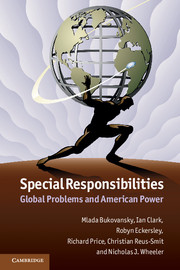5 - Global finance
Published online by Cambridge University Press: 05 June 2012
Summary
The financial crisis of 2007–9 severely shook global confidence in the regulatory approach and capacities of the United States. Is the country which, since the end of the Second World War has been the presumed lynchpin of the global financial order, still capable of exercising special responsibilities in the domain of global finance? Has the US been consistent in exercising special financial responsibilities, or has its faith in the ability of market forces to be self-regulating undermined the exercise of special responsibilities? Since special responsibilities are ‘socially sanctioned’ powers, the answers to these questions depend not only on our assessment of US material power, interests and will to lead, but also on how US authority is viewed by other important actors in the domain of global finance.
In keeping with the overall orientation of this volume, our primary focus in this chapter is on how special responsibilities have been articulated by states and in international institutions. However, we cannot neglect the responsibilities of market players in global finance, especially now that many have grown so large, and the amount of capital they command is so voluminous. The interplay between private firm and market responsibilities on the one hand and political responsibilities on the other, is thus an important theme explored in this chapter. In the political realm, we highlight and analyse the tension between formal articulations of responsibility embedded in institutions such as those negotiated at Bretton Woods, and more informal tacit arrangements which have at times replaced and supplemented the formal agreements. We find a pervasive tension between the institutionalised expression of general responsibilities of all states on the one hand, and informal or tacit articulations and claims of special responsibilities of specific states on the other. This tension can at least partly be understood as an aspect of the gap between formal equality and actual differentiation of capability so often faced in international society, as laid out in the introductory chapter of this volume. The broader normative context of sovereign equality, and concerns of narrow national self-interest, condition and in some cases limit the articulation of special responsibilities, rendering certain forms of special responsibility more tacit than explicit, and others the source of contention and conflict. And yet, the influence of claims of special responsibilities is discernible in shaping developments that cannot be adequately accounted for in terms of material power politics.
- Type
- Chapter
- Information
- Special ResponsibilitiesGlobal Problems and American Power, pp. 163 - 210Publisher: Cambridge University PressPrint publication year: 2012



